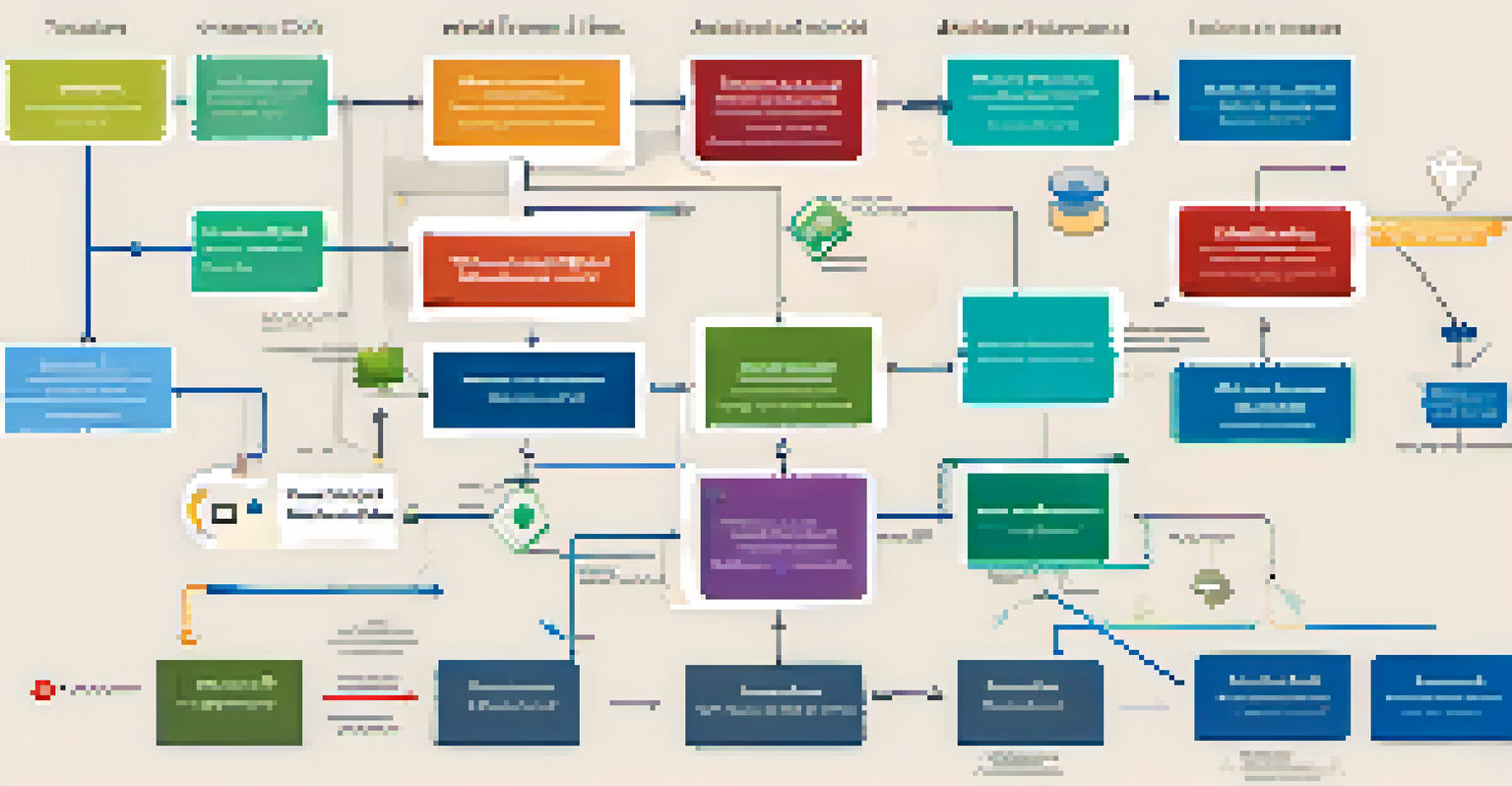How Smart Contracts Revolutionize Blockchain Transactions

Understanding Smart Contracts: The Basics Explained
Smart contracts are self-executing contracts with the agreement directly written into code. They operate on blockchain technology, ensuring that transactions are transparent and secure. Imagine them as digital vending machines: input the right conditions (like coins), and you receive your desired outcome (like a snack) automatically.
Smart contracts are the digital contracts of the future, designed to automate and secure transactions without the need for intermediaries.
These contracts eliminate the need for intermediaries, which traditionally slow down transactions and add costs. By automating processes, smart contracts can increase efficiency and reduce human error. This shift not only saves time but also builds trust among parties involved.
In essence, smart contracts are revolutionizing how we approach agreements, making them faster and more reliable. As we dive deeper into the mechanics of blockchain, understanding smart contracts becomes essential for grasping their full potential.
How Smart Contracts Ensure Trust and Transparency
One of the standout features of smart contracts is their ability to ensure trust without the need for a middleman. Since the contract is stored on the blockchain, all parties can access the same information, reducing the chances of disputes. Think of it like a shared notebook where everyone can see the same notes—no room for misunderstandings.

This transparency is crucial in industries where trust is paramount, such as finance and real estate. For instance, a property sale can be executed through a smart contract that automatically transfers ownership upon payment. This not only streamlines the process but also protects all parties involved.
Smart Contracts Enhance Trust
Smart contracts create a transparent environment by eliminating intermediaries, allowing all parties to access the same information.
By minimizing the possibility of fraud and deception, smart contracts foster a more trustworthy environment for transactions. This trust factor is a game-changer, encouraging more people and businesses to engage in blockchain-based transactions.
Efficiency Gains: Speeding Up Transactions
Smart contracts significantly speed up transaction processes by automating execution when conditions are met. Imagine how frustrating it is to wait for a bank to process a transfer—it can take days. With smart contracts, these transactions occur in real-time, allowing for immediate execution.
The real power of blockchain technology lies in smart contracts, which enable trust and transparency in digital transactions.
This efficiency is particularly beneficial in areas like supply chain management, where timely communication and action are critical. For example, a smart contract can automatically release payment to a supplier once goods are delivered, ensuring that all parties are satisfied without unnecessary delays.
By cutting down on wait times and manual interventions, smart contracts not only enhance productivity but also improve cash flow for businesses. This newfound speed can lead to a more dynamic marketplace where transactions happen seamlessly.
Reducing Costs: The Financial Benefits of Smart Contracts
One of the most appealing aspects of smart contracts is their potential to reduce costs associated with traditional transaction methods. By eliminating intermediaries like banks or legal advisors, parties can save on fees that often stack up during a transaction. It's like taking a shortcut through a park rather than following the winding road—faster and cheaper.
Moreover, the automation of tasks means that businesses can allocate resources more efficiently. Instead of spending money on paperwork and administrative tasks, they can focus on growth and innovation. This shift can be particularly beneficial for startups that often operate on tight budgets.
Efficiency Boost in Transactions
By automating processes, smart contracts significantly speed up transactions, allowing for immediate execution and improved cash flow.
Ultimately, the cost savings realized through smart contracts can empower businesses to invest in other areas, driving further innovation and competition within industries. This financial advantage makes blockchain technology more attractive to a broader audience.
Real-World Applications: Where Smart Contracts Shine
Smart contracts are not just theoretical; they are already making waves across various industries. In finance, they facilitate everything from loans to insurance claims, ensuring that processes are executed accurately and promptly. For instance, imagine filing an insurance claim that automatically triggers payment once certain conditions are met—no waiting and no hassle.
In real estate, smart contracts streamline property transactions by handling everything from offers to closing, while maintaining transparency throughout the process. This not only reduces the time it takes to buy or sell a property but also minimizes the chances of disputes over ownership.
These use cases illustrate the versatility of smart contracts, showcasing their potential to transform industries and improve the way transactions are conducted. As more sectors adopt this technology, we can expect to see even more innovative applications emerge.
Challenges and Limitations of Smart Contracts
Despite their many benefits, smart contracts are not without challenges. One significant limitation is the reliance on the quality of the code written. If there are errors or vulnerabilities in the code, it can lead to unintended consequences, much like a faulty vending machine that gets stuck and doesn't dispense your snack.
Additionally, the legal status of smart contracts is still evolving. In many jurisdictions, they may not yet hold the same weight as traditional contracts, leading to potential legal complications. It's crucial for businesses to stay informed about the regulatory landscape to navigate these challenges effectively.
Cost Savings Through Automation
Smart contracts reduce costs by minimizing the need for intermediaries, enabling businesses to allocate resources more effectively.
These hurdles shouldn't deter innovation but rather encourage a more cautious approach. As the technology matures and legal frameworks adapt, we can expect smart contracts to become more robust and widely accepted.
The Future of Blockchain Transactions with Smart Contracts
As we look ahead, the future of blockchain transactions appears bright with the integration of smart contracts. Their ability to facilitate secure, efficient, and cost-effective transactions positions them as a cornerstone of the next wave of digital innovation. Imagine a world where sending money, buying property, or signing agreements happens seamlessly with just a few clicks.
Moreover, as industries continue to explore the potential of blockchain technology, smart contracts will likely play a pivotal role in shaping new business models. From decentralized finance (DeFi) to automated supply chains, the possibilities seem endless.

In conclusion, smart contracts are more than just a trend; they represent a fundamental shift in how we conduct transactions. With ongoing advancements and a growing understanding of their benefits, we can expect them to become an integral part of our digital economy.